The Day of the Jackal (1973)
Directed by: Fred Zinnemann
Written by: Frederick Forsyth, Kenneth Ross
Starring: Edward Fox, Michael Lonsdale, Michel Auclair, Terence Alexander
USA
AVAILBLE ON DUAL FORMT BLU-RAY AND DVD: 4th September, from ARROW VIDEO
RUNNING TIME: 143 mins
REVIEWED BY: Dr Lenera, Official HCF Critic
On 22 August 1962, a failed assassination attempt is made on the President of France General Charles de Gaulle by the militant French underground organisation OAS in anger over the French government granting independence to Algeria. Within six months, OAS leader Jean Bastien-Thiry and several other members of the plot are captured, and Bastien-Thiry is executed. The remaining OAS leaders, now exiled in Vienna, decide to make another attempt, and hire a professional British assassin who chooses the code name “Jackal”. The OAS’s chief clerk Viktor Wolenski reveals under torture some names connected with the plot including the word “Jackal”. Police Commissioner Berthier recommends his deputy, Claude Lebel, as the best person to head the mission to identify and catch the Jackal….
It occured to me a few times whilst watching The Day Of The Jackal that one’s enjoyment of the film could be measured on how well you know your history, specifically whether you know if Charles de Gaulle was actually assasinated for real or not, though considering how damn tense I was finding the film to be despite knowing the facts, I soon dismissed those thoughts. Back when I first saw the film on TV over 30 years ago, I distinctly remember the Radio Times kindly informing us of the truth, and a quick perusal of other reviews reveals that many critics do the same. Just in case you don’t know the ending and aren’t tempted to find out on the internet prior to watching Arrow Video’s Blu-ray release of the film nor read any other reviews, I’m not going to tell it to you as the film will probably be even more exciting even though it’s exciting enough even when you do have the information. Truth be told I recall finding the movie rather boring as a youngster, but now as an adult in his 40’s I found a hell of a lot to appreciate and enjoy. Largely devoid of what we term “action” – the only shooting is right at the beginning and right at the end and even that is extremely brief – it adopts a very sober and realistic, not to mention meticulous, approach so that you really believe what you’re watching and it all feels incredibly authentic.
John Frankenheimer wanted to direct this, and later used its screenwriter Kenneth Ross on his Black Sunday, but Fred Zinnemann got the job after having spent much time trying to set up two other projects. Robert Redford, Michael Caine, Jack Nicholson and Roger Moore were considered for the role of the Jackal, but Zinnerman wanted the Jackal to be played by someone anonymous and indistinct, and chose Edward Fox after being impressed by the way he delivered the line: “Nothing is ever a lady’s fault” in The Go-Between. When Zinnemann met him for the first time, Fox recalled that his exact words were: “Any actor who could make that line believable has got my ticket.” During shooting, the author of the novel, Frederic Forsythe, introduced Edward Fox to an actual hired killer whom he had known when he was a war reporter in Africa. Filming took place at Pinewood Studios, Italy, England, Austri and France where Zinnemann was able to film in locations usually restricted to filmmakers – such as inside the Ministry of the Interior – due in large part to French producer Julien Derode’s skill in dealing with authorities. Being allowed to film a real parade caused crowd members to mistake the actors portraying police officers for real officers, and many tried to help them arrest the “suspects” they were apprehending. A scene where the Jackal shoots the Gunsmith was cut just before release. The film was critically lauded though only did average business.
The opening scenes do a very good job of setting the scene though I’m not sure that we needed explanatory narration from two cast members. When we see the OAS leader Jean Bastien-Thiry executed by a firing squad, we’re left in no doubt that the “good” guys are going to be just as ruthless as the “bad” guys, something confirmed soon after when they torture Viktor Wolenski for information. By contrast, our charming, well dressed, easy going anti-hero initially seems a rather nice chap, though it soon becomes apparent that he’s able and willing to kill if there’s even just the slightest need to. He murders quite a few people in this film, but the kills are quick and discreet, and in this particular film this feels exactly right. Lots of blood and prolonged deaths may have taken away from the feeling of utter callousness and the ease with which this guy can take lives. A good example is what seems to be a strangling – it’s done partly in shadow and is over in two seconds. Despite all this he doesn’t really come across as a particularly evil man, nor do we have scenes of him trying to justify his procession or flashbacks to a traumatic past or whatever. Edward Fox has never been an actor I’ve particularly rated, but in this film, where he reminded me of Donald Sutherland in Eye Of The Needle, he’s note perfect even though we’re not told much about his character and he often does things which don’t make sense or aren’t explained, from continuing with his assignment even though he’s been told that the police are on to him and half his fee is in the bank, to, knowing that the police are searching every hotel in Paris, choosing to go to a gay bathhouse and spend the night at a man’s apartment. I don’t this is down to script flaws that the Jackal is such an enigma, it’s clearly intentional and was quite common in films made during a time where it was more common for filmmakers to not feed so much to the viewer.
Pitted against Fox is Michael Lonsdale [one of the best of all Bond villains] who, with his rather odd manner that’s unique to him, is an actor I’ve always liked. Again, we don’t really get close to his Claude Lebel, but this is obviously by design, the script making us keep our distance. We cut back and forth between the Jackal’s meticulous preparing for his mission and the investigation into stopping him, but how can the authorities catch someone whose identity, whereabouts and even his modus operandi they don’t know. Things are made even more difficult by the fact that the AOS have planted a mole in the secret service so they are always one step ahead of them, a woman called Denise who beds high ranking official St. Clair who lets out certain information as pillow talk. The early scene where Denise is recruited to do this dirty job epitomisises the minimlist approach taken with the film in regard to plot and background. There’s mention of a fiancée who did something wrong, so possibly Denise is being blackmailed, but we’re not sure. The man burns the fiancée’s letters, we briefly see the woman in tears, and then it’s quickly on to the next scene. We’re not actually told much detail at all, but the whole scene has a harsh sadness about it. Talking of women, the film does lose its edge a bit when the Jackal himself gets himself some female company at one point, a fellow hotel guest called Colette. He clearly has no feelings whatsover for her and his liason with her is something of a mistake, but needs must and all that. He makes another mistake soon after because he’s really tired – and how often does this happen in a film like this? Usually the main characters seem to be possessed of super-human endurance.
A cut from the Jackal jokingly saying: “Well, rob a bank” to the OAS chiefs who are balking at his fee, to an actual explosion inside a bank, may provide a chuckle, though it’s all generally very serious. Despite much of the film being dialogue-heavy, actual scenes are kept short and to the point, with the result that the story keeps moving forward pretty swiftly despite a shortage of the thrills you’d probably get if the film was made today – though in it’s own way The Day Of The Jackal is still quite thrilling anyway despite its considerable length, even though the opposite may seem the case to readers who’ve never seen the film. By the time the climax comes along, I was on tender hooks as to where on earth the Jackal was, which means that I would say that Zinnemann succeeded in the challenge he set himself – to thrill viewers even though some of them may know the ending. He’s helped immensely by the terrific cinematography of Jean Tournier. These days, cameramen who attempt to provide a documentary feel tend to think that shaking the camera all over the place is the thing to do, but back when The Day Of The Jackal was made this kind of thing was still considered bad filmmaking. Instead, some of the footage looks like it was taken by hidden cameras, while there’s also much use of the zoom lens to establish locations. There’s also no music score and a great deal of silence employed.
The likes of Cyril Cusack, Derek Jacobi and Maurice Denham provide nice little characterisation in a rich cast, while Adrien Cayla-Legrand really does look like De Gaulle for the short time he’s on the screen. As long as you don’t expect an action fest [though neither, come to think of it, was the rather underrated remake], The Day Of The Jackal is a highly satisfying experience that I thoroughly recommend on Blu-ray. Despite the advancement in technology since it was made [they’d probably catch this guy in a few hours today], in most other respects it doesn’t seem to have really dated. It’s sure proof that in the hands of a fine director you don’t really need gunplay, fights and chases at all to thrill the viewer.
Previously available on Blu-ray in vanilla editions, The Day Of The Jackal has been brilliantly restored by Arrow Video. The colour pallette is generally quite muted, but the picture is as detailed as you could want and there’s just the right level of grain to remind you that you’re still watching a film from 1974. Arrow have provided a few special features. Zinnemann biographer Neil Sinyard is in his usual good form, talking about the project’s gestation, analysing the film and his three favourite scenes in it for over half an hour. The two French archival clips are very brief but we see the director talking about the film and two scenes being filmed. It’s not a huge selection of extras compared with Arrow’s usual output, but then none of the previous editions had anything on them whatsoever, and in this case the film is most definitely the thing.
SPECIAL FEATURES:
*High Definition Blu-ray (1080p) presentation
*Original uncompressed mono audio
*Optional English subtitles for the deaf and hard of hearing
*In the Marksman’s Eye – a new interview with Neil Sinyard, author of Fred Zinnemann: Films of Character and Conscience
*Two rare archival clips from the film set, including an interview with Fred Zinnemann
*Theatrical trailer
*Original screenplay by Kenneth Ross (BD-ROM content)
*Reversible sleeve featuring original and newly commissioned artwork by Peter Strain
*FIRST PRESSING ONLY: Collector’s booklet featuring new writing by critic Mark Cunliffe and film historian Sheldon Hall

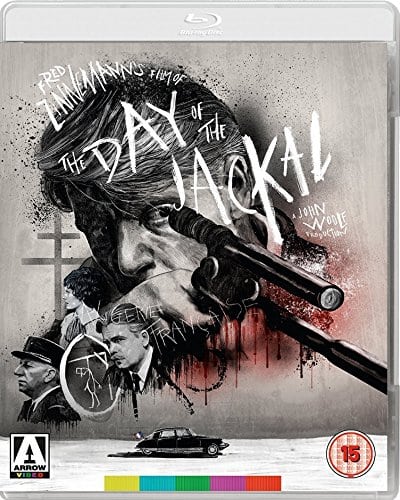
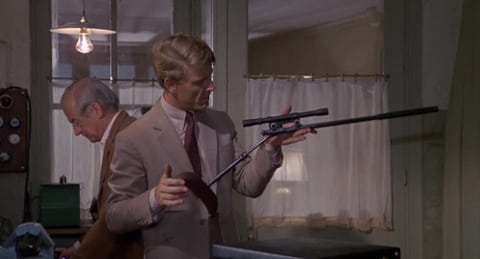
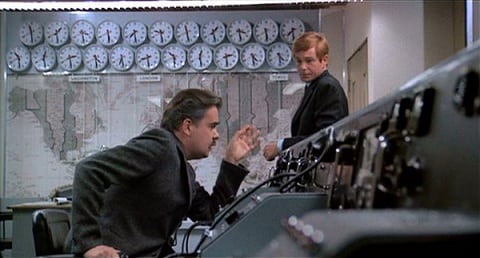




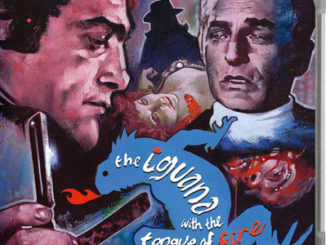
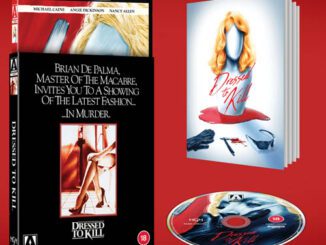
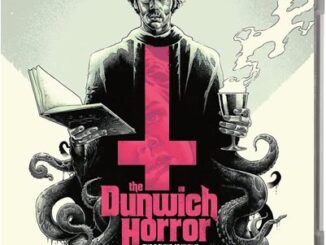
Be the first to comment